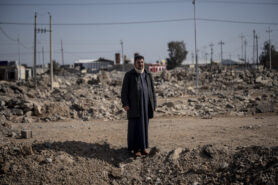Modern warfare is becoming increasingly defined by distance. Today, many Western and non-Western states have shied away from deploying large numbers of their own troops to battlefields. Instead, they have limited themselves to supporting the frontline fighting of local and regional actors against non-state armed forces through the provision of intelligence, training, equipment and airpower. This is remote warfare, the dominant method of military engagement now employed by many states. Despite the increasing prevalence of this distinct form of military engagement, it remains an understudied subject and considerable gaps exist in the academic understanding of it. Bringing together writers from various backgrounds, this edited volume offers a critical enquiry into the use of remote warfare.
‘In Chapter 2, ‘The Remote Warfare Paradox: Democracies, Risk Aversion and Military Engagement’, Jolle Demmers and Lauren Gould of Utrecht University’s Intimacies of Remote Warfare programme explore how the secrecy surrounding remote warfare removes war from public debate and potentially makes states more violent.
Access the book by clicking on the reference below:



